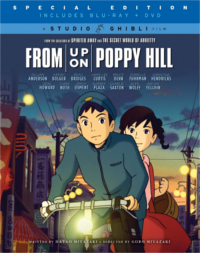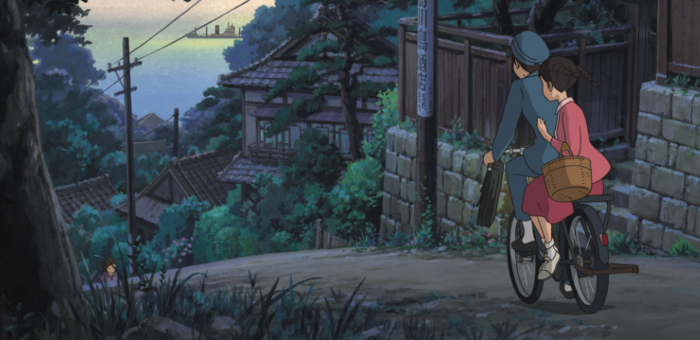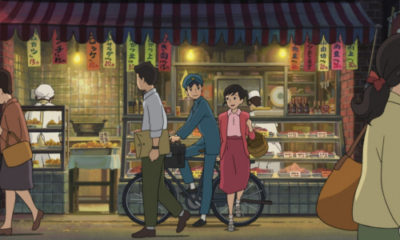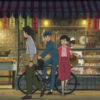Disc Reviews
From Up On Poppy Hill | Blu-ray Review
 Being the son of animation’s unequivocal living master who’s body of work ranks among the best cinematic creations ever made, Goro Miyazaki understandably had much trepidation about taking up his father, Hayao’s craft, eventually to be put in comparison to each other, for better or worse. When he finally succumbed to the family business after being approached by Toshio Suzuki, one of Studio Ghibli’s longest running producorial collaborators, neither Ghibli’s seasoned animators or the majesty of the company’s lineage could save Goro’s paltry debut, Tales from Earthsea. Notably missing Hayao’s direct involvement thanks to familiar disagreements, the film, rich with dragons and magic, became one of the least enchanting releases of Ghibli’s generally pristine catalog. Approaching Goro’s sophomore effort with the same apprehension he began his directorial career, with doubts of creative significance lingering in the long, overbearing shadow of his father, we find that From Up On Poppy Hill abides as a worthy, yet still minor entry into the Ghibli universe.
Being the son of animation’s unequivocal living master who’s body of work ranks among the best cinematic creations ever made, Goro Miyazaki understandably had much trepidation about taking up his father, Hayao’s craft, eventually to be put in comparison to each other, for better or worse. When he finally succumbed to the family business after being approached by Toshio Suzuki, one of Studio Ghibli’s longest running producorial collaborators, neither Ghibli’s seasoned animators or the majesty of the company’s lineage could save Goro’s paltry debut, Tales from Earthsea. Notably missing Hayao’s direct involvement thanks to familiar disagreements, the film, rich with dragons and magic, became one of the least enchanting releases of Ghibli’s generally pristine catalog. Approaching Goro’s sophomore effort with the same apprehension he began his directorial career, with doubts of creative significance lingering in the long, overbearing shadow of his father, we find that From Up On Poppy Hill abides as a worthy, yet still minor entry into the Ghibli universe.
Based on a serialized comic by Tetsurō Sayama about Japanese youth off the Port of Yokohama as they prepare for the coming 1964 Tokyo Olympics, Hayao and Keiko Niwa’s somewhat typecasting script follows the tale of a pigtailed teenage girl named Umi. The daughter of a fallen seaman of the Korean War, she still raises signal flags abreast of the boarding house in which she currently lives, as if failing to do so will cause her to forget her father’s valiant memory. After fortuitously taking part in a stunt promoting the conservation of the student body’s beloved, but decrepit old clubhouse from the clutches of Olympic demolition, Umi quickly falls for a young boy at the head of the charge, a handsome, zealous young man named Shun, who we soon find has been a secret admirer of sorts, the author of an anonymously published poem venerating Umi’s daily flag flying. Though at first their relationship seems one of juvenile flirtation, unbeknownst to both parties, their acquaintance runs much deeper than initially foreseen.
At its core, the tale retains a standard Ghibli theme – that of adolescent self discovery in the face of personal hardship – but what is odd, especially when taking into consideration that Hayao was one of the two screenwriters on the project, Goro’s film settles into the realistic lineage of Hayao’s partner, Isao Takahata, the director of such films as the monumentally devestating war feature, Grave of the Fireflies, and the lighter dramatic romance, Only Yesterday. Amusingly, Poppy Hill shares the most semblance with Takahata’s Pom Poko, a tragi-comedy about the impacts of deforestation for Japan’s fabled magical raccoon population. Sharing a visual language of humorous uniformal character masses (matching academic attire against shape-shifting grey raccoons) and a kindred light-hearted tonality, both pictures deal with the challenges of saving a cherished homestead, though Goro’s film carries much less consequential weight and still fails to yield the lyrical whimsy of Takahata’s often overlooked classic.
Though failing to achieve any real depth – the vast majorty of the character body is glanced over in broadly generic pretenses and the final epoch rings a bit emotionally hollow – there are pure moments of heartwarming cinematic bliss. The scene in which Shun gives Umi a bike ride down Poppy Hill to the seaside market is both obvious in its affective manipulation and subtly magical all the same. And while Tales from Earthsea lacked the lush attention to detail that ranks as just one facet that sets Ghibli apart from other arbiters of hand drawn animation, Poppy Hill makes visual leaps and bounds ahead of Goro’s lackluster debut. Every frame is meticulously hand crafted to embody the maturing cultural revolution of the 60s with fine appreciation for the period and a love of seaside living. Drawing all of these foreign parts together, Satoshi Takebe’s jovially jazzy original score perfectly sets the mood for gleefully rebellious teens to rage against the machine that is the local board of education.
The shadow cast by Hayao Miyazaki and the linage of Studio Ghibli has got to be soul crushingly oppressive for the still fresh faced helmer. From Up On Poppy Hill is certainly not Goro’s Nausicaä, but it’s not a total failure either. Even Hayao and Isao had years of animation experience under their belts working on Future Boy Conan and other cable shows before making any of their masterpieces. The younger Miyazaki just seems to need a little practice. Let’s hope the third time’s a charm.
Disc Review:
Though Miramax first brought Ghibli to an American audience with its lackluster handling of Princess Mononoke, Disney has since dutifully taken up the task with a stream of cleaned up, full feature releases of catalogue classics and several new films like Ponyo and The Secret World of Arrietty. But despite Disney’s apt handling, Cinedigm has outdone the masters of animation with this outstanding Blu-ray release of From Up On Poppy Hill. As we’ve come to expect from animated features in HD, the Miyazakis’ latest film is nothing short of breathtaking in action. Lines are clean and crisp, colors warm and backgrounds gorgeously detailed. The DTS-HD master track pairing nicely, shows tremendous dimension. Voices simmer down to whispers or ramp up to the hustle and bustle of crowded city streets, the sound of cars swirling around the room throughout the peripherals. Truly an immersive mix. Not only that, but this dual format DVD/Blu-ray release comes packaged in an attractive glossy slipcase and absolutely stacked with extras.
Storyboards
As an alternative for those interested in the film’s conception, you can watch the storyboards along with the full soundtrack. 90 min
Director Goro Miyazaki on Yokohama
Introspective and soft spoken, Goro sits before the camera in an empty theatre talking at length about the village which the film is built around and working within the restrictions of a ‘period piece’. He also speaks about physical changes he made to the town in animation form in order to integrate the visuals of the story more fluidly. 17 min
Yokohama – Stories of the Past and Present
Known as the Japanese gate to the sea, Yokohama has always been a port city. This light but informational short doc takes us back to the 50s and 60s and compares shots to that of the modern day city with on screen factual text and a solid bed of piano that lines the entire piece. 22 min
“Summer of Farewells” Music Video
Mixing film imagery, archival footage of Yokohama, and shots of Aoi Teshima singing, this is a weak music video at best, but some of the archival footage is interesting. 5 min
English Voice Cast Featurette
Centered around an interview with Gary Rydstrom with input from scriptwriter Karey Kirkpatrick, the English Language Production Director, this piece gives some insight into the dubbing process, how it is cast and how the entire translation and recording process works. We are also introduced to the cast – Sarah Bolger, Anton Yelchin, Ron Howard, Aubrey Plaza, Alex Wolff, Beau Bridges, Jamie Lee Curtis (who does an incredible crying baby imitation), Emily Osment, Isabelle Fuhrman, Charlie Saxton and Bruce Dern. 22 min
Press Conference – Theme Song Announcement
Held shortly after the The Great East Japan Earthquake and resulting tsunami on March 11, 2011, Miyazaki and the staff of Studio Ghibli reflect on the devastation and delve into the importance of continuing forth creating animated films. 39 min
Hayao Miyazaki’s Speech After the Staff Screening
In the wake of the earth quake and tsunami, Ghibli struggled to keep the film on schedule. Here, Hayao shows his appreciation for his faithful, hard-working staff. 6 min
Trailers
Going above and beyond, there are three theatrical Japanese trailers, a barrage of Japanese TV spots and an American trailer with an immensely different tone. 9 min
Final Thoughts:
Though From Up On Poppy Hill lacks the magic or pure emotion of some of Ghibli’s finest work, Goro’s sophomore feature still stands as a testament to why hand drawn animation should never perish in the face of digital wizardry. Cinedigm’s home release is an absolute must have for Ghibli fans and an easy recommendation for anyone interested in animation. Plus, with Hayao Miyazaki apparently set to officially announce his retirement within the week, this will be one of his final film credits.































